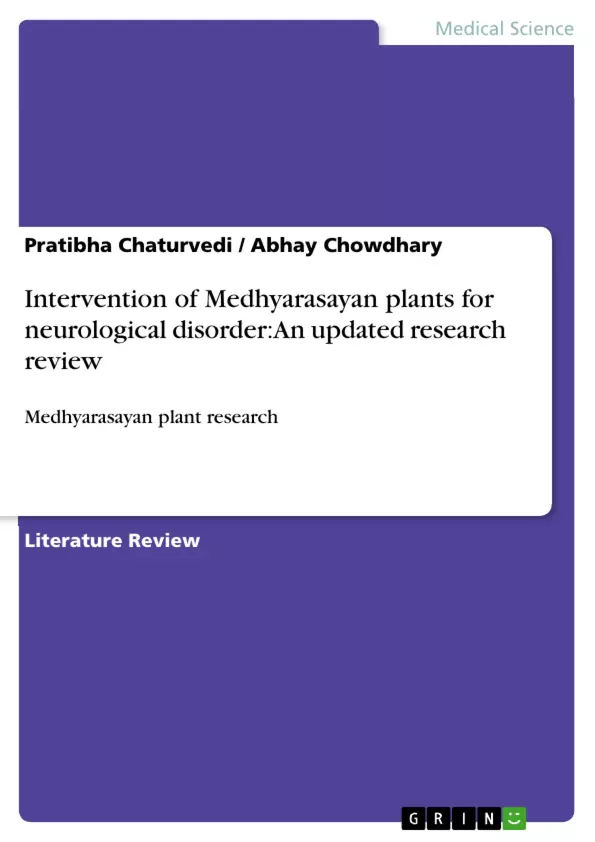Background:There is increasing awareness of the use of Traditional medicine in today’s medical practices. This is a known fact that over 80% of the world population depends on herbal medicines and product for healthy living. The disappointment appears due to adulteration in the drugs, which is critical side for herbal manufacturers. Hence there is a need to develop validation techniques to prevent health, consumer’s faith as also for economic productivity. Medhya Rasayanas are a group of medicinal plants described in Ayurveda (Indian system of medicine) with multi-fold benefits, specifically to improve memory and intellect by Prabhava (specific action). Medha means intellect / retention and Rasayana means therapeutic procedure that on regular practice will boost nourishment, health, memory, intellect and immunity.
Objective: To increase the awareness of use of medhyarasayan plants in nuerological disorders by giving light of research updates.
Method: The research updates of Four Medhyarasayan plant spp namely Withania somnifera, Bacopa monnerie, Nardostachys jatamansi , Centell asiatica is mentioned in the present review covering the preclinical research aspact as also with mentioning their active principals.
Results and Conclusion: The present review deals with a study of modern techniques/bioassays useful in validation of some Medhyarasayan plants. On the other hand, they are beneficial to understand metabolomics, physiology, biochemistry and proteomics of living being and also play a vital role in drug discovery.
Inhaltsverzeichnis (Table of Contents)
- Graphical Abstract
- Structural Abstract
- Background
- Objective
- Method
- Results and Conclusion
- Key words
- Introduction
Zielsetzung und Themenschwerpunkte (Objectives and Key Themes)
This review aims to highlight the growing importance of Medhyarasayan plants in neurological disorders, providing an overview of current research findings.
- The use of traditional medicine, particularly Ayurveda, in modern medical practices.
- The importance of validation techniques to ensure quality and safety of herbal medicines.
- The specific action of Medhyarasayan plants in improving memory and intellect.
- The preclinical research on four key Medhyarasayan plants: Withania somnifera, Bacopa monnerie, Nardostachys jatamansi, and Centell asiatica.
- The role of modern techniques and bioassays in understanding the metabolomics, physiology, and biochemistry of Medhyarasayan plants.
Zusammenfassung der Kapitel (Chapter Summaries)
- Background: This section introduces the increasing reliance on traditional medicine and the need for quality control in herbal products. It highlights the importance of Medhyarasayan plants in Ayurveda for enhancing cognitive function.
- Objective: This section outlines the review's objective to raise awareness about the use of Medhyarasayan plants in neurological disorders through the lens of current research.
- Method: This section explains the approach used for the review, focusing on four specific Medhyarasayan plant species and their preclinical research aspects.
- Results and Conclusion: This section discusses the potential of modern techniques and bioassays for validating Medhyarasayan plants. It highlights the benefits of these techniques in understanding the biological mechanisms of these plants and their applications in drug discovery.
- Introduction: This section provides a historical overview of Ayurveda, its origins, and its evolution as a system of medicine. It discusses the increasing global interest in traditional medicine and the importance of understanding the efficacy and safety of herbal products.
Schlüsselwörter (Keywords)
The primary keywords and focus topics of this text include traditional medicine, Ayurveda, Medhyarasayan, validation, techniques, bioassays, neurological disorders, plant-derived bioactive natural products, phytochemistry, pharmacology, computer modeling, and drug discovery.
Frequently Asked Questions
What are Medhyarasayan plants in Ayurveda?
Medhyarasayanas are a group of medicinal plants in the Indian Ayurvedic system known for improving memory, intellect, and overall immunity.
Which specific plants are covered in this research review?
The review focuses on four key species: Withania somnifera (Ashwagandha), Bacopa monnieri (Brahmi), Nardostachys jatamansi (Jatamansi), and Centella asiatica (Gotu Kola).
How can Medhyarasayan plants help with neurological disorders?
Preclinical research suggests these plants have neuroprotective properties and can enhance cognitive functions like retention and mental clarity.
Why is validation important for herbal medicines?
Validation techniques prevent drug adulteration, ensure consumer safety, and maintain faith in the efficacy of traditional herbal products.
What modern techniques are used to study these plants?
Scientists use bioassays, computer modeling, and metabolomics to understand the biochemistry and pharmacology of Ayurvedic medicinal plants.
- Quote paper
- Dr. Pratibha Chaturvedi (Author), Prof Abhay Chowdhary (Author), 2018, Intervention of Medhyarasayan plants for neurological disorder: An updated research review, Munich, GRIN Verlag, https://www.grin.com/document/430181



